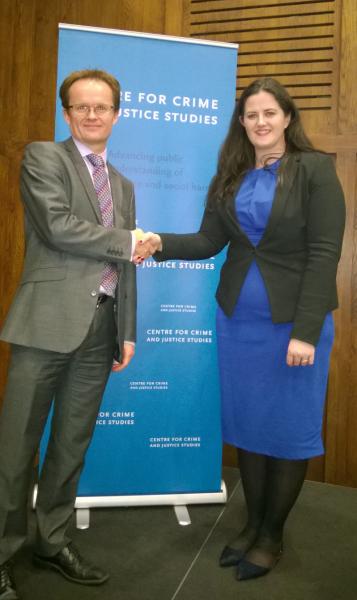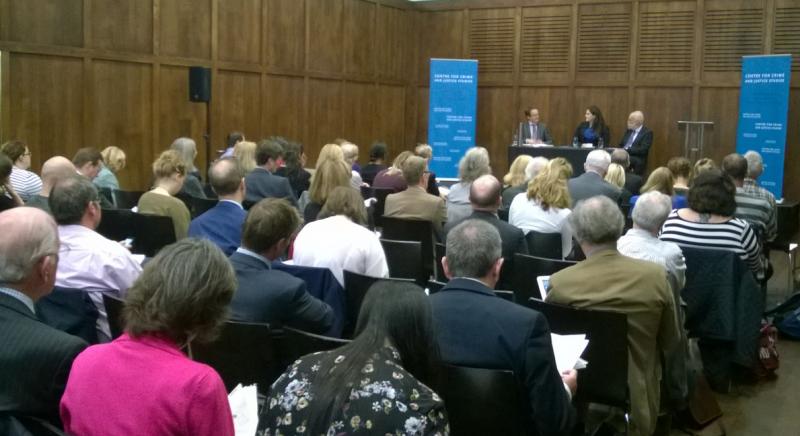Too many vulnerable people being criminalised
Far too many vulnerable people are being drawn into the justice system, the Northern Ireland Justice Minister, Claire Sugden, told our conference on the UK justice systems on Wednesday.
Speaking at Criminal Justice since 2015: What happened? What next?, the Minister said that the Northern Ireland justice system had made major progress since the devolution of justice powers to the Northern Ireland Assembly in 2010. But, there was still much to do to achieve 'transformative change' that placed prevention and problem-solving at its heart.
 |
Claire Sudgen with Richard Garside |
The Minister also said that she looked forward to the day when it was not necessary to speak about the ongoing threat of terrorism.
The Northern Ireland Justice Minister was among experts from across the four nations and regions of the United Kingdom who reviewed criminal justice developments since the 2015 General Election.
Professor Rod Morgan, former HM Chief Inspector of Probation and former Chair of the Youth Justice Board, told the conference that the Home Secretary Amber Rudd and Justice Secretary Liz Truss were 'substantially untried ministers' whose 'faltering speeches to the Conservative Party Conference' gave little basis for predictions about the future direction of policy.
Brexit, he argued, 'changed everything', making the government's finances 'highly uncertain' and the likely direction of criminal justice policy difficult to predict.
The former Scottish Justice Secretary, Kenny MacAskill, said that criminal justice policy since the Scottish independence referendum in 2014 had largely continued in the direction he had set during his period in office.
But he welcomed the decision to discontinue the development of a new prison for women at Greenock, arguing that it had become untenable to build it once Nicola Sturgeon had been elected leader of the SNP.
He also said he thought it unlikely that there would be a second referendum on Scottish independence.
Dusty Kennedy, Director of Youth Justice Board Cymru, highlighted the dramatic fall in first-time entrants into the youth justice system and the fall in the youth custodial population in Wales.
 Echoing Claire Sugden's comments, he drew attention to the high proportion of young people with multiple criminal convictions who had faced trauma and neglect and had little in the way of formal qualifications.
Echoing Claire Sugden's comments, he drew attention to the high proportion of young people with multiple criminal convictions who had faced trauma and neglect and had little in the way of formal qualifications.
The Chief Inspector of Prisons for Scotland, David Strang, mounted a strong defence of the independent inspection regime. Those detained in prison, he argued, were vulnerable to mistreatment. Inspection and monitoring played a vital role in assessing both the condition of prisons, and the treatment of prisoners.
Neil Carey, Audit Manager at the National Audit Office, spoke about the role of audit in challenging criminal justice institutions to improve and deliver value for money.
Although the management of cases had improved since 2010, he noted, the criminal justice system was not currently delivering value for money.
The conference formed part of the Centre's UK Justice Policy Review programme of activity. Our Director, Richard Garside, who chaired the event, emphasised the importance of assessing criminal justice developments across the United Kingdom's four nations and regions.